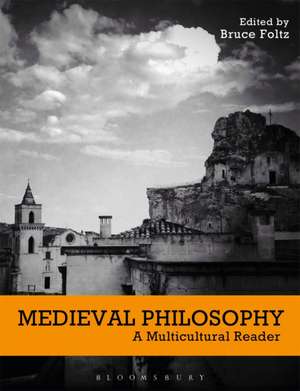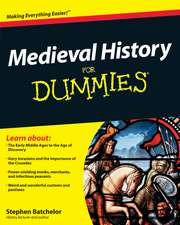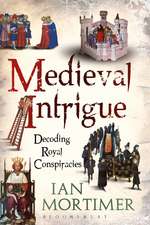Medieval Philosophy: A Multicultural Reader
Editat de Bruce Foltzen Limba Engleză Hardback – 20 feb 2019
| Toate formatele și edițiile | Preț | Express |
|---|---|---|
| Paperback (1) | 276.79 lei 3-5 săpt. | |
| Bloomsbury Publishing – 20 feb 2019 | 276.79 lei 3-5 săpt. | |
| Hardback (1) | 853.21 lei 6-8 săpt. | |
| Bloomsbury Publishing – 20 feb 2019 | 853.21 lei 6-8 săpt. |
Preț: 853.21 lei
Preț vechi: 1078.11 lei
-21% Nou
Puncte Express: 1280
Preț estimativ în valută:
163.26€ • 170.89$ • 135.89£
163.26€ • 170.89$ • 135.89£
Carte tipărită la comandă
Livrare economică 31 martie-14 aprilie
Preluare comenzi: 021 569.72.76
Specificații
ISBN-13: 9781472580405
ISBN-10: 1472580400
Pagini: 736
Dimensiuni: 189 x 246 x 45 mm
Greutate: 1.69 kg
Editura: Bloomsbury Publishing
Colecția Bloomsbury Academic
Locul publicării:London, United Kingdom
ISBN-10: 1472580400
Pagini: 736
Dimensiuni: 189 x 246 x 45 mm
Greutate: 1.69 kg
Editura: Bloomsbury Publishing
Colecția Bloomsbury Academic
Locul publicării:London, United Kingdom
Caracteristici
Includes extensive resources for students and teachers including an appendix providing lists of readings under several problem headings, to assist those who prefer teaching medieval philosophy topically rather than chronologically
Notă biografică
Bruce Foltz is Emeritus Professor of Philosophy at Eckerd College, USA.
Cuprins
Foreward (Bernard McGinn, Naomi Shenstone Donnelley Professor Emeritus of Historical Theology and of the History of Christianity, University of Chicago, USA)List of ContributorsIntroduction (Bruce Foltz, Emeritus Professor of Philosophy, Eckerd College, USA)Part 1: Ancient Philosophy as a Spiritual Tradition: Predecessors of Medieval Philosophy (Editor: Eric Perl, Professor of Philosophy, Loyola Marymount University,USA)1. Plato: Selections from, Phaedrus, Timaeus, Symposium, Republic2. Aristotle: Selections from Nicomachean Ethics, On the Soul, Metaphysics3. Cicero: Selections from On the Nature of the Gods4. Epictetus: Selections from Handbook5. Plotinus: Selections from Enneads6. Proclus: Selections from Elements of Theology and Commentary on Plato's "Parmenides"Part 2. The Greek Tradition (Editor: David Bradshaw, Professor of Philosophy, University of Kentucky, USA)1. Justin Martyr: Selections from First Apology and Second Apology2. Ireneaus, Selections from Against Heresies3. Clement of Alexandria: Selections from Stromata4. Origen: Selections from On First Principles5. Athanasius: Selections from On the Incarnation and Against the Arians6. Basil of Caesarea: Selections from The Long Rules, Hexaemeron, Epistle 234, On the Holy Spirit, That God Is Not the Cause of Evil7. Gregory Nazianzen, Selections from Orations8. Gregory of Nyssa: Selections from On Virginity, Life of Moses9. Evagrius of Pontus, Selections from Praktikos, On Thoughts, On Prayer10. John Chrysostom, Selections from Homilies 6, 3, 4, 45, 16, 811. Dionysius the Areopagite: Selections from Divine Names; Mystical Theology; Celestial Hierarchy12. Philoponus: Selections from Against Proclus on the Eternity of the World13. Maximus the Confessor: Selections from Centuries on Charity; Chapters on Theology and Economy; Mystagogy; Ambigua14. John of Damascus: Selections from On the Orthodox Faith and Defense of the Holy Icons15. Symeon the New Theologian: Selections from Catechetical Discourses and Hymns16. Gregory Palamas: Selections from TriadsPart 3. The Latin Christian Tradition (Editor: Peter Casarella, Associate Professor of Theology, Notre Dame University, USA)1. Augustine: Selections from Confessions and De Civitate Dei2. Boethius: Selections from The Consolation of Philosophy3. John Scottus Eriugena: Selections from On the Division of Nature (Periphyseon)4. Anselm: Selections from Proslogion5. Bonaventure of Bagnoregio: Selections from Itinerarium mentis in Deum6. Thomas Aquinas: Selections from On Being and Essence and Summa Theologiae7. Marguerite Porete: Selections from The Mirror of Simple Souls8. Meister Eckhart: Selections from German Sermons and Parisian Questions9. John Duns Scotus: Selections from Ordinatio10. William of Ockham: Selections from Summa Logicae11. Nicholas of Cusa: Selections from On Learned IgnorancePart 4: The Jewish Tradition (Editor: Sarah Pessin, Associate Professor of Philosophy, University of Denver, USA)1. Overview2. Introduction to Rabbinic, Midrashic, and Early Mystical Writings3. Selections from Babylonian Talmud4. Selections from Sifre Numbers5. Selections from Midrash Rabbah6. Selections from Sefer Ye?irah (The Book of Creation)7. Selections from Zohar8. Philo: Selections from On the Creation and Allegorical Interpretations9. Isaac Israeli: Selections from Book of Substances, Book of Spirit and Soul, Mantua Text10. Saadya: Selections from The Book of Doctrines and Beliefs11. Ibn Gabirol, Selections from Ahavtikha, Genesis Commentary, Fons Vitae, The Improvement of the Moral Qualities12. Judah Halevi: Selections of Poetry and Selections from Kuzari13. Bahya Ibn Pequda, Selections from Duties of the Heart14. Moses Maimonides, Selections from Guide of the Perplexed and Commentary on the Mishnah15. Gersonides, Selections from Wars of the LordPart 5: The Islamic Tradition (Editor: Mohammad Azadpur, Professor of Philosophy, San Francisco State University, USA)1. Selections from Theology of Aristotle2. Razi: Selections from The Book of Philosophical Life and The Proofs of Prophecy3. Alfarabi: Selections from Attainment of Happiness and On the Intellect4. Avicenna, Selections from De Anima of the Book of Salvation and The Metaphysics of the Healing5. Ghazzali: Selections from Deliverance from Evil6. Ibn Tufayl: Selections from ?ayy Ibn Yaq?an, a Philosophical Tale7. Averroes: Selections from Decisive Treatise Determining What the Connection is between Religion and Philosophy8. Suhrawardi: Selections from The Philosophy of Illumination9. Ibn Arabi: Selections from Meccan Revelations10. Mulla Sadra: Selections from The Wisdom of the Throne TimelineMapsSuggestions for Further ReadingSourcesIndex
Recenzii
That the title of this book clearly signals the multiculturalism and pluralism of medieval thought is to its credit. The book is organized in five sections: an opening section looks at Greco-Roman sources, and each of the remaining four sections treats a major linguistic or cultural grouping in medieval thought: Byzantine, Jewish, Latin, and Muslim. Each section offers translated selections of relevant major works of the tradition. This being the case, the volume could serve as a resource in survey courses . Summing Up: Recommended. Lower- and upper-division undergraduates.
It's great to have alongside each other a large selection of the crucial texts of Western medieval philosophy, in its Christian (Greek and Latin), Jewish and Islamic branches. I know of no other anthology which would enable students to see the similarities and differences between the different ways in which ancient Greek philosophy developed in the Middle Ages, and the interactions between them.
This large and comprehensive volume of primary source material provides the reader not only with key medieval philosophical texts from the Latin Christian, Byzantine, Islamic, and Jewish traditions, but also with a judicious selection of foundational texts from the ancient Greek philosophical period, both pagan and patristic. There is no other source book that matches this one in breadth and depth.
This brave new anthology opens up new ways of studying and understanding medieval philosophy, both by fully including the Arabic, Jewish and Greek, as well as the Latin traditions, and through its admirably broad conception of what texts count as philosophical.
It's great to have alongside each other a large selection of the crucial texts of Western medieval philosophy, in its Christian (Greek and Latin), Jewish and Islamic branches. I know of no other anthology which would enable students to see the similarities and differences between the different ways in which ancient Greek philosophy developed in the Middle Ages, and the interactions between them.
This large and comprehensive volume of primary source material provides the reader not only with key medieval philosophical texts from the Latin Christian, Byzantine, Islamic, and Jewish traditions, but also with a judicious selection of foundational texts from the ancient Greek philosophical period, both pagan and patristic. There is no other source book that matches this one in breadth and depth.
This brave new anthology opens up new ways of studying and understanding medieval philosophy, both by fully including the Arabic, Jewish and Greek, as well as the Latin traditions, and through its admirably broad conception of what texts count as philosophical.















